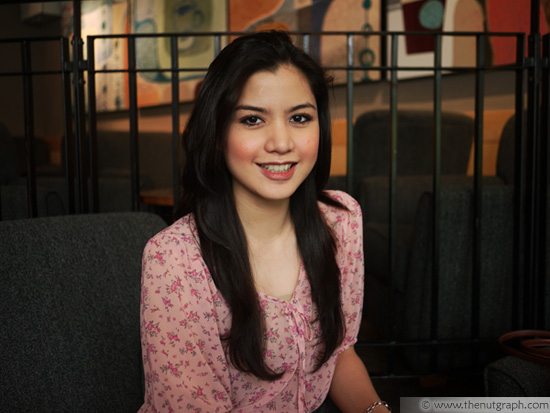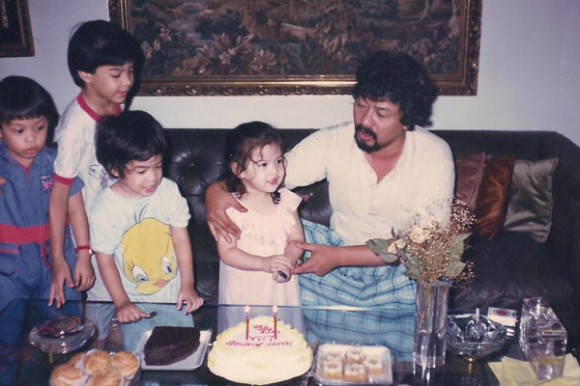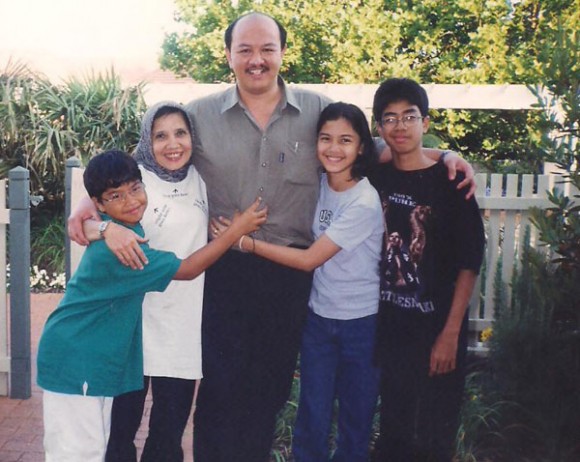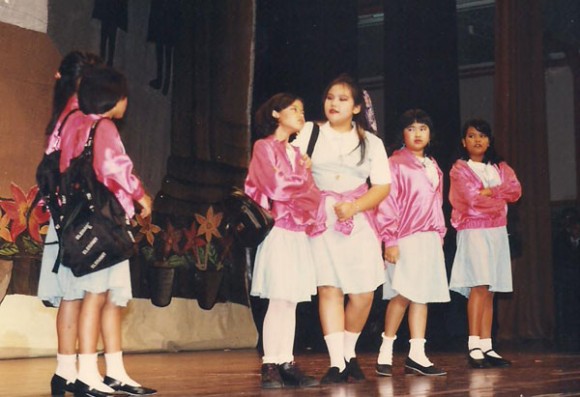SINCE winning the Best New Actress award at the Malaysian Film Festival in 2007, 25-year-old actress and television personality Lisa Surihani has been in constant demand in the local film industry. She won Best Actress at the 23rd Malaysian Film Festival Award in 2010, and also racked up the Popular Film Actress Award in the Anugerah Bintang Popular Berita Harian in the same year.

Lisa started acting at the age of 11, but only joined the industry full-time after she graduated in 2008, armed with a degree in law from HELP University College and Aberystwyth University in Wales, UK. She was also one of the four from the entertainment industry (the others were Aznil Nawawi, Amy Search and Low Ngai Yuen) who were invited to attend the 1Malaysia Online Roundtable at the prime minister’s office in July 2011.
Lisa spoke to The Nut Graph on 26 Aug 2011 at Ampang’s Great Eastern Mall, Kuala Lumpur, on her thoughts about the importance of education and national unity.
TNG: Where were you born?
I was born [in 1986] at the Pantai Medical Centre in Bangsar, KL. My earliest memories were of the time when I was three years old, staying on Jalan Gurney. We moved to Kampung Pandan later. At the Gurney house, I remember playing catch with my brother. I fell downstairs and tripped over my other brother, knocked something over, and that gave me a Harry Potter scar (points to a scar on her forehead).
I was a very quiet girl when I was small. I was really shy and got bullied a lot because I was quiet, I guess. So I climbed trees on my own in the playground.
What is your family history like? Can you trace your lineage?
We are pretty much rojak. My mom is part Bugis, and my father is pure Bugis. Mom’s father is Bugis, her mom is from Malacca, and she had a Chinese grandfather.

On my father’s side, my great-grandfather is from an Indonesian island called Pulau Siantan. Tok Mat later migrated to Johor. My maternal grandfather is from Penang, but he never talked about his Bugis heritage much – maybe it was because back then, they had had family problems which caused them to run to the Peninsula.
Thankfully, we have aunts and uncles on my father’s side who are historians, so we know quite a bit about Tok Mat’s heritage. Technically, he comes from a line of rulers or stewards of Pulau Siantan, and was supposed to have ruled the island. But when he was actually asked to go back to the island, he opted not to.
My father was the seventh generation, and my nephew, who is my eldest brother’s son, is the youngest in line to rule the island. Sometimes we joke about it – “Wow, we kind of own an island!” However, I grew up here and I’m not sure I would want to go back there. But I’m proud of my heritage.
What are some of the lessons or stories from your family that you hold on to?
I remember that my parents would train us to be respectful to elders, and they would never scold us in front of others. We would go to our uncles’ and aunties’ houses, for example, and during playtime we might have done or said something naughty or somewhat rude. But they would never scold us in front of others, [they would] just talk to us later in the car.
So that trained us kids to be quite matured in our thinking. It was instilled in us that if we wanted to be seen as good kids, we had to respect others to get respect.
And when in your childhood did you start getting a sense of being Malaysian? Did it coincide at all with being aware about concepts like race?
It was not so much an issue growing up, because I grew up in a family with Chinese aunts and uncles. And my mom’s grandfather was actually Chinese, from China, and he had Indian and Arab blood as well. So growing up in that environment or with that knowledge meant it never dawned on me that there was any division in the country.
I think with our generation now, it is hard to find someone who is actually “pure”. There is bound to be some mixture somewhere.

For me, being Malaysian was more about culture than anything else. We grew up watching a lot of [foreign] cartoons like Thundercats and Power Rangers, and I remember becoming aware that that culture was different from ours. The way the characters were and how they spoke was different from Malaysians, who were softer, more polite, and peaceful. So that was what I recognised as being Malaysian, as opposed to it being racial.
What do you hope and wish for when it comes to our country?
When I was invited to sit on the 1Malaysia Roundtable Malaysia, I suggested some things related to the industry I am in. But there were also social issues, which involve instilling a culture of being more charitable. I think we have many walkathons and other fundraisers, but I’ve heard people say so many times that they can’t actually be involved in charity because they are struggling with their finances as well. When it comes to finances, so many people say, “Oh yeah, I save some in Amanah Saham, and that’s about it.”
I think as a society, we lack financial management. This needs to be instilled in my generation. When we can manage our finances well, we can definitely be more charitable, too, whatever one’s income may be. I think we have too much short-term thinking and too much of a “go with the flow” attitude.
And what about issues related to your industry?
This is just my opinion, but I am concerned about people thinking that it is okay to discontinue their tertiary education because they can jump into the entertainment industry. We have to make education paramount no matter what. I’ve seen people missing school because they are in the industry – it is their prerogative, and their parents’, but it is a concern.
I think being in the industry is something serious and it is about a career path – where do you see yourself in 10 years, and what can you contribute to the industry? I was hoping to suggest a prerequisite before people enter the industry – maybe studying something closely related to the industry. If you enjoy scriptwriting or computer-generated imagery (CGI), then take it as a prerequisite. Then you have a qualification and you are not putting education aside.

What do you hope in years to come for Malaysia?
I’m really proud of our country. We have achieved a lot and have put ourselves on the map. For a time we had the tallest building, biggest airports, and we are progressive in that sense. But I hope we achieve this vision 2020 where we also look into the welfare of the people. London is one of my favourite cities, and the recent riots were very disappointing to see – because a bunch of looters and kids took advantage of the situation. They are supposed to be “more developed” than us.
We had an instance recently with the Bersih rally, where potentially violence could have happened. But it didn’t happen, it did not lead to any point of danger or fear. So in that way, that is something we should be very proud of, and something that is a point for reflection. ![]()
The book Found in Malaysia Volume 2, which was launched on Malaysia Day 2011, is now available in bookstores for RM50. It features previously unpublished interviews with Asha Gill, Lillian Too, Khairy Jamaluddin and Baru Bian. Volume 1 of Found in Malaysia, featuring 54 earlier interviews, is currently in its second print run and retailing at RM45.


peasant says
Are there any instances of Malay Malaysians in this series who had less than glorious ancestors – kings, princes, rulers?
Adam says
I skipped this article earlier as I felt I am not so proud of Malaysia due to so many recent issues on race, religion and politics. Today, somehow, I managed to browse through the various articles, including this one, and having read it, I do feel a little proud that most Malaysians are united in our common quest for success and achievements. It is actually not so much about where we come from, or whether we have glorious ancestors or not. It is more about the varied and colourful ancestry we come from, and how each generation takes the opportunities available to achieve their own goals in life.
The purpose and intentions of this series of articles are indeed noble, and the message that should ring out loud and clear is that race should not and must not be used to divide the people, but to unite all of us in our common destiny as Malaysians.
Congrats to Lisa for her success, and thank you TNG for doing your part in fostering good race relations among all Malaysians.